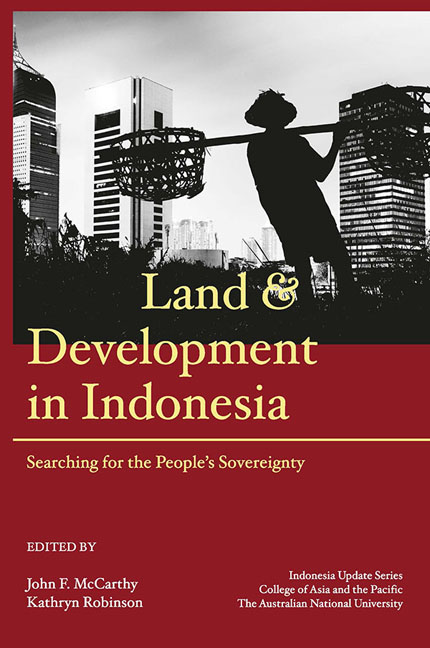Book contents
- Frontmatter
- Contents
- Tables
- Figures
- Contributors
- Acknowledgements
- Glossary
- Map
- 1 Land, economic development, social justice and environmental management in Indonesia: the search for the people's sovereignty
- PART 1 LAND USE AND LAND LAW: THE BIG PICTURE
- PART 2 ENVIRONMENTAL AND CUSTOMARY FRAMING OF LAND TENURE
- PART 3 URBAN AND INFRASTRUCTURE DEVELOPMENT
- PART 4 AGRICULTURE, LAND TENURE AND LIVELIHOODS
- PART 5 LARGE-SCALE LAND ACQUISITIONS AND SMALLHOLDER DEVELOPMENT
- Index
- Miscellaneous Endmatter
1 - Land, economic development, social justice and environmental management in Indonesia: the search for the people's sovereignty
Published online by Cambridge University Press: 29 July 2017
- Frontmatter
- Contents
- Tables
- Figures
- Contributors
- Acknowledgements
- Glossary
- Map
- 1 Land, economic development, social justice and environmental management in Indonesia: the search for the people's sovereignty
- PART 1 LAND USE AND LAND LAW: THE BIG PICTURE
- PART 2 ENVIRONMENTAL AND CUSTOMARY FRAMING OF LAND TENURE
- PART 3 URBAN AND INFRASTRUCTURE DEVELOPMENT
- PART 4 AGRICULTURE, LAND TENURE AND LIVELIHOODS
- PART 5 LARGE-SCALE LAND ACQUISITIONS AND SMALLHOLDER DEVELOPMENT
- Index
- Miscellaneous Endmatter
Summary
Unresolved land governance questions are at the heart of President Joko Widodo's political agenda. On 14 October 2014, a week before his inauguration, Widodo made a speech touching on several key issues facing Indonesia: reducing greenhouse gas emissions from annual forest fires; resolving a plethora of often violent disputes in the mining and agricultural sectors; and addressing the poverty of farmers eking out an existence on tiny plots of land (Saturi 2014). During his first months in office the president sought to develop infrastructure to promote development and ease land acquisition for investors. Many of these initiatives and policy statements responded to a deeply held desire among Indonesians for an administration that could steward development, pursue social justice and reduce conflict. Such policies depend on addressing land questions, which are central to economic development, social justice and environmental management.
The state needs to recognise and protect the insecure tenurial rights of many Indonesians while finding ways to support forms of development that assist the majority, to deal with proliferating land conflicts, to resolve the property rights question at the heart of Indonesia's unsustainable environmental transition and to provide affordable housing for the poor. In this introductory chapter we discuss these dilemmas in relation to wider international debates about natural resource management, land governance and social justice. For instance, what role might land reform play in poverty alleviation? Can the formalisation of property rights provide a significant means of ensuring development? How might initiatives to recognise customary (adat) tenure protect indigenous landowners? How can more effective land-tenure governance build on existing localised, vernacular forms of tenure? Can securing tenure in forest areas ensure effective carbon sequestration in forests and address deforestation? Do international governance initiatives, such as those that involve greater corporate social responsibility or that seek to ensure free, prior and informed consent (FPIC) in land transactions, provide an effective means of dealing with land grabs?
We find that land issues are becoming ever more urgent as demand for land, pressure for individual title over land and the increasing commercialisation of land, including the large-scale acquisition of land by corporate entities, continue to generate conflict. While the shift to a more democratic and decentralised political system has led to gradual progress, the reform of Indonesia's land tenure regime remains a perpetual work in progress.
- Type
- Chapter
- Information
- Land and Development in IndonesiaSearching for the People's Sovereignty, pp. 1 - 32Publisher: ISEAS–Yusof Ishak InstitutePrint publication year: 2016

